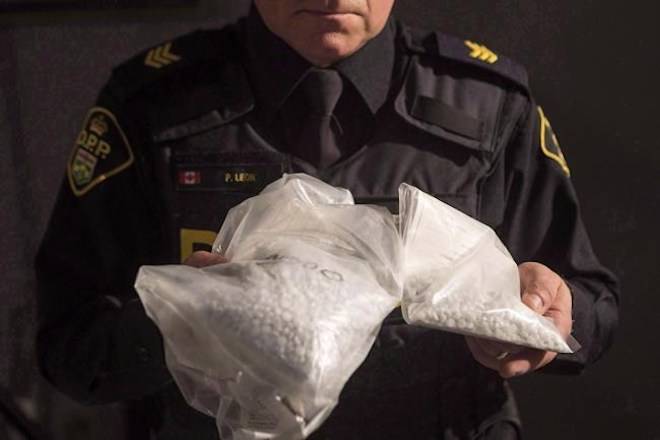Canada’s police chiefs are urging Ottawa to beef up its fight against the scourge of opioids by more closely vetting people who import pill presses.
In a resolution passed at its annual conference in Halifax, the Canadian Association of Chiefs of Police said the federal government did not go far enough when it introduced changes that made it illegal to import unregistered presses.
The chiefs say the illicit use of presses has helped increase the supply of street drugs containing synthetic opioids such as fentanyl, contributing to a crisis of overdose deaths.
According to figures published in June, there were 3,987 apparent opioid-related deaths in Canada in 2017, the vast majority of which were unintentional. Almost-three quarters of accidental opioid-related deaths involved fentanyl or fentanyl analogues, compared to 55 per cent the previous year.
Police raids of drug labs have shown that presses, encapsulators, stamps and dyes are widely used in producing counterfeit pills.
“In our efforts to disrupt this illegal market we were frustrated with the ease at which these devices could be purchased and imported,” the chiefs said in a background document made public Tuesday.
“Several investigations have revealed the significant amount of pills that could be produced for street distribution with these industrial pill presses.”
Changes to the Controlled Drugs and Substances Act last year introduced a registration requirement to import pill presses. But the chiefs say tightening these provisions further would help police.
“Counterfeit pills containing fentanyl and its analogues continue to make their way to the illicit drug markets across Canada,” says the background document.
The new resolution calls for comprehensive scrutiny of people and businesses importing pill presses and encapsulators, including a requirement to spell out the equipment’s intended use. In addition, the chiefs want controls over domestic sales of imported presses.
Scott Bardsley, a spokesman for Public Safety Minister Ralph Goodale, said Tuesday the federal department values the chiefs’ input and “will listen carefully to their views as we continue our work to keep Canadians safe.”
He noted that importers are already required to register the address where a pill press will be used, and that information can be disclosed to police as part of an investigation.
Related: B.C. mother writes to fight opioid crisis
Related: B.C. moves to restrict pill presses in opioid battle
British Columbia, which has been hard hit by opioid overdoses, introduced legislation in April aimed at restricting ownership, possession and use of manufacturing equipment, including presses.
The bill would require those looking to sell the equipment to register and consent to a criminal record check. In addition, there are notification provisions concerning sales.
“This bill is critical in bolstering police efforts to disrupt the supply chain and get counterfeit pills off of the streets and out of the hands of those who recklessly distribute death-dealing drugs,” B.C. Public Safety Minister Mike Farnworth said at the time.
Jim Bronskill , The Canadian Press



